#wealth tax
Text
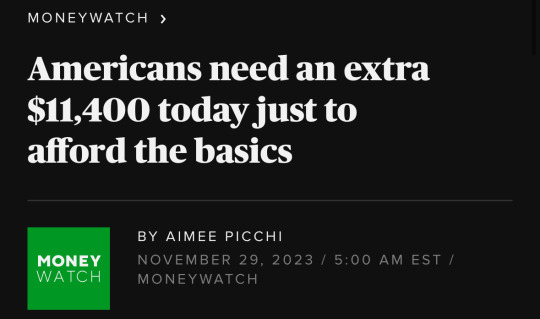
Source
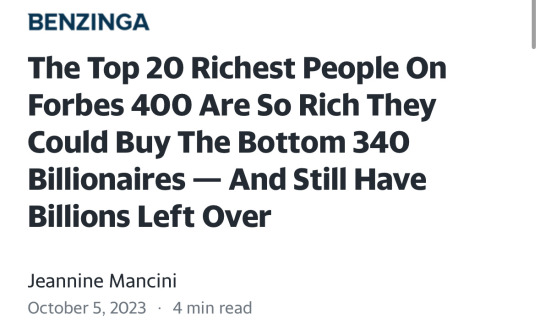
Source
👍🏼
#nothing to see here#capitalism#end capitalism#wealth tax#tax the rich#eat the rich#news#current events#government#the left#progressive
10K notes
·
View notes
Text
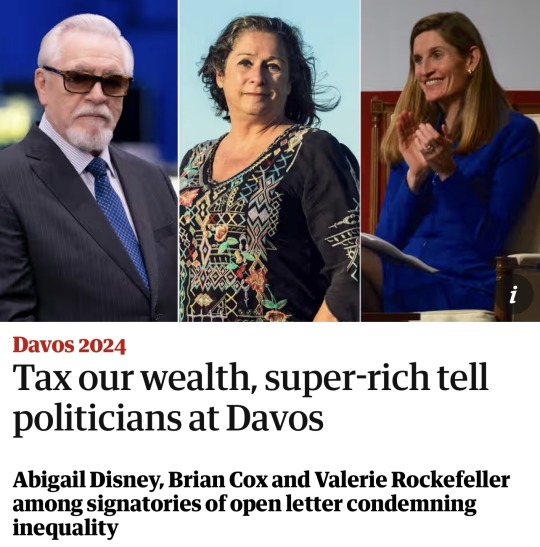
More than 250 billionaires and millionaires are demanding that the political elite meeting for the World Economic Forum in Davos introduce wealth taxes to help pay for better public services around the world.
“Our request is simple: we ask you to tax us, the very richest in society,” the wealthy people said in an open letter to world leaders. “This will not fundamentally alter our standard of living, nor deprive our children, nor harm our nations’ economic growth. But it will turn extreme and unproductive private wealth into an investment for our common democratic future.”
The rich signatories from 17 countries include Disney heir Abigail Disney; Brian Cox who played fictional billionaire Logan Roy in Succession; actor and screenwriter Simon Pegg; and Valerie Rockefeller, an heir to the US dynasty.
“We are also the people who benefit most from the status quo,” they said in a letter titled Proud to Pay, which they will attempt to deliver to world leaders gathered in Davos in Switzerland on Wednesday. “But inequality has reached a tipping point, and its cost to our economic, societal and ecological stability risk is severe – and growing every day. In short, we need action now.”
(continue reading)
#politics#wealth tax#inequality#davos#tax the rich#davos 2024#brian cox#abigail disney#valerie rockefeller#world economic forum#proud to pay
288 notes
·
View notes
Video
youtube
You Are Being Lied to About the IRS
The IRS is set to receive its largest funding increase in years thanks to the Inflation Reduction Act.
You know who should be worried about this?
Wealthy Americans who dodge taxes.
Recent figures estimate that the richest 1 percent are hiding more than 20 percent of their earnings from the IRS, accounting for more than a third of all unpaid federal taxes.
Some estimates show that collecting all unpaid federal income taxes from the wealthiest Americans could generate anywhere from $200 billion to $1.75 trillion over the decade.
So why hasn’t our government been able to collect all that untaxed money from the richest of the rich? Because the IRS has been underfunded and severely understaffed – thanks in large part to a decades-long campaign from Republicans to transfer wealth to the top.
Over the past 10 years, the IRS budget has been reduced by roughly 20%. Its staffing is at a level not seen since 1973 although the American population is about a third larger now.
On top of that, the tax returns of the wealthy are very difficult, time consuming, and incredibly costly to audit – and rich taxpayers often have platoons of lawyers and accountants that shield them from tax liabilities.
Without proper resources, it’s harder for the IRS to go after the wealthiest Americans who avoid paying their fair share.
As a result, just 2% of the richest Americans had their taxes audited in 2019, down from 16% in 2010.
Meanwhile, the poorest Americans – who often claim a tax break known as the earned income tax credit – are five times more likely to get audited because their tax returns are less complex, and because of pressure from congressional Republicans to root out incorrect payments of the credit.
When the IRS can’t function properly, all taxpayers aren’t off the hook evenly – and the result is a tax system stuck in a cycle where the working class bears the brunt while the rich hoard wealth that could be used to invest in America.
So, don’t believe the lies coming from the oligarchs and their propaganda machine– it’s all fear mongering. The 1% have an incentive to keep the IRS hobbled and unable to excavate their hidden wealth.
They also know the public is against them – boosting the IRS budget to strengthen tax enforcement on high-income taxpayers is a popular policy supported by more than two-thirds of registered voters.
IRS funding is a good thing. It means the agency can finally go after the real freeloaders in America: The super-rich.
2K notes
·
View notes
Text
Elizabeth Warren on weaponized budget models

In yesterday’s essay, I broke down the new series from The American Prospect on the hidden ideology and power of budget models, these being complex statistical systems for weighing legislative proposals to determine if they are “economically sound.” The assumptions baked into these models are intensely political, and, like all dirty political actors, the model-makers claim they are “empirical” while their adversaries are “doing politics”:
https://pluralistic.net/2023/04/03/all-models-are-wrong/#some-are-useful
If you’d like an essay-formatted version of this post to read or share, here’s a link to it on pluralistic.net, my surveillance-free, ad-free, tracker-free blog:
https://pluralistic.net/2023/04/04/cbo-says-no/#wealth-tax
Today edition of the Prospect continues the series with an essay by Elizabeth Warren, describing how her proposal for universal child care was defeated by the incoherent, deeply political assumptions of the Congressional Budget Office’s model, blocking an important and popular policy simply because “computer says no”:
https://prospect.org/economy/2023-04-04-policymakers-fight-losing-battle-models/
When the Build Back Better bill was first mooted, it included a promise of universal, federally funded childcare. This was excised from the final language of the bill (renamed the Bipartisan Infrastructure Bill), because the CBO said it would cost too much: $381.5b over ten years.
This is a completely nonsensical number, and the way that CBO arrived at it is illuminating, throwing the ideology of CBO modeling into stark relief. You see, the price tag for universal childcare did not include the benefits of childcare!
As Warren points out, this is not how investment works. No business leader assesses their capital expenditures without thinking of the dividends from those investments. No firm decides whether to open a new store by estimating the rent and salaries and ignoring the sales it will generate. Any business that operates on that basis would never invest in anything.
Universal childcare produces enormous dividends. Kids who have access to high-quality childcare grow up to do better in school, have less trouble with the law, and earn more as adults. Mothers who can’t afford childcare, meanwhile, absent themselves from the workforce during their prime earning years. Those mothers are less likely to advance professionally, have lower lifetime earnings, and a higher likelihood of retiring without adequate savings.
What’s more, universal childcare is the only way to guarantee a living wage to childcare workers, who are disproportionately likely to rely on public assistance, including SNAP (AKA food stamps) to make ends meet. These stressors affect childcare workers’ job performance, and also generate public expenditures to keep those workers fed and housed.
But the CBO model does not include any of those benefits. As Warren says, in a CBO assessment, giving every kid in America decent early childhood care and every childcare worker a living wage produces the same upside as putting $381.5 in a wheelbarrow and setting it on fire.
This is by design. Congress has decreed that CBO assessments can’t factor in secondary or indirect benefits from public expenditure. This is bonkers. Public investment is all secondary and indirect benefits — from highways to broadband, from parks to training programs, from education to Medicare. Excluding indirect benefits from assessments of public investments is a literal, obvious, unavoidable recipe for ending the most productive and beneficial forms of public spending.
It means that — for example — a CBO score for Meals on Wheels for seniors is not permitted to factor in the Medicare savings from seniors who can age in their homes with dignity, rather than being warehoused at tremendous public expense in nursing homes.
It means that the salaries of additional IRS enforcers can only be counted as an expense — Congress isn’t allowed to budget for the taxes that those enforcers will recover.
And, of course, it’s why we can’t have Medicare For All. Private health insurers treat care as an expense, with no upside. Denying you care and making you sicker isn’t a bug as far as the health insurance industry is concerned — it’s a feature. You bear the expense of the sickness, after all, and they realize the savings from denying you care.
But public health programs can factor in those health benefits and weigh them against health costs — in theory, at least. However, if the budgeting process refuses to factor in “indirect” benefits — like the fact that treating your chronic illness lets you continue to take care of your kids and frees your spouse from having to quit their job to look after you — then public health care costings become indistinguishable from the private sector’s for-profit death panels.
Child care is an absolute bargain. The US ranks 33d out of 37 rich countries in terms of public child care spending, and in so doing, it kneecaps innumerable mothers’ economic prospects. The upside of providing care is enormous, far outweighing the costs — so the CBO just doesn’t weigh them.
Warren is clear that there’s no way to make public child care compatible with CBO scoring. Even when she whittled away at her bill, excluding millions of families who would have benefited from the program, the CBO still flunked it.
The current budget-scoring system was designed for people who want to “shrink government until it fits in a bathtub, and then drown it.” It is designed so that we can’t have nice things. It is designed so that the computer always says no.
Warren calls for revisions to the CBO model, to factor in those indirect benefits that are central to public spending. She also calls for greater diversity in CBO oversight, currently managed by a board of 20 economists and only two non-economists — and the majority of the economists got their PhDs from the same program and all hew to the same orthodoxy.
For all its pretense of objectivity, modeling is a subjective, interpretive discipline. If all your modelers are steeped in a single school, they will incinerate the uncertainty and caveats that should be integrated into every modeler’s conclusions, the humility that comes from working with irreducible uncertainty.
Finally, Warren reminds us that there are values that are worthy of consideration, beyond a dollars-and-cents assessment. Even though programs like child care pay for themselves, that’s not the only reason to favor them — to demand them. Child care creates “an America in which everyone has opportunities — and ‘everyone’ includes mamas.” Child care is “an investment in care workers, treating them with respect for the hard work they do.”
The CBO’s assassination of universal child care is exceptional only because it was a public knifing. As David Dayen and Rakeen Mabud wrote in their piece yesterday, nearly all of the CBO’s dirty work is done in the dark, before a policy is floated to the public:
https://prospect.org/economy/2023-04-03-hidden-in-plain-sight/
The entire constellation of political possibility has been blotted out by the CBO, so that when we gaze up at the sky, we can only see a few sickly stars — weak economic nudges like pricing pollution, and not the glittering possibilities of banning it. We see the faint hope of “bending the cost-curve” on health care, and not the fierce light of simply providing care.
We can do politics. We have done it before. Every park and every highway, our libraries and our schools, our ports and our public universities — these were created by people no smarter than us. They didn’t rely on a lost art to do their work. We know how they did it. We know what’s stopping us from doing it again. And we know what to do about it.
Have you ever wanted to say thank you for these posts? Here’s how you can: I’m kickstarting the audiobook for my next novel, a post-cyberpunk anti-finance finance thriller about Silicon Valley scams called Red Team Blues. Amazon’s Audible refuses to carry my audiobooks because they’re DRM free, but crowdfunding makes them possible.
[Image ID: A disembodied hand, floating in space. It holds a Univac mainframe computer. The computer is shooting some kind of glowing red rays that are zapping three US Capitol Buildings, suspended on hovering platforms. In the background, the word NO is emblazoned in a retrocomputing magnetic ink font, limned in red.]
#empirical facewash#wealth tax#elizabeth warren#cbo#congressional budget office#penn wharton budget model#budgeting#economics#economism#computer says no#pluralistic#universal childcare#build back better#bipartisan infrastructure bill
251 notes
·
View notes
Text
The oligarchs are taking over in plain sight and nobody is organized to fight back. Nobody even cares.
🎩
97 notes
·
View notes
Text
Fair taxes on the UK’s biggest polluters - namely fossil fuel companies and the extremely rich – could have raised up to £23bn last year, according to a report published by Oxfam today.
This finance could be used for much needed climate action such as expanding renewable energy and increasing the energy efficiency of people’s homes – as well as supporting communities on the frontline of the climate crisis.
The money raised would have been enough to cover the cost of insulating seven million UK homes as well as fitting them with low-carbon heating and still have nearly £11bn remaining.
The report, Payment Overdue, Fair ways to make polluters across the UK pay for climate justice, shows that by targeting those who are most responsible for emissions, the government can quickly and fairly secure much-needed funds to help tackle the climate crisis while ensuring the burden does not fall on ordinary UK households.
63 notes
·
View notes
Text
not Maria Hill the secret socialist

#deep down we’re all a little socialist#what if season 2#what if#mcu#mcu memes#marvel memes#wealth tax#tax the rich#marvel cinematic universe#socialist awakening#socialist#socialism#secret socialist
29 notes
·
View notes
Text
The magic salary number is 2080
That's the number you get if you work 40 hours a week, 52 weeks a year.
So if a job is paid hourly, you can multiply the pay by 2080 to get your yearly "salary". And if a job just lists a salary, you can divide that by 2080 to get the hourly pay. Here are some example hourly to yearly pays:
$7.25 hourly = $15,080 yearly
$15 hourly = $31,200 yearly
$24 hourly = $50,000 yearly
$36 hourly = $75,000 yearly
$48 hourly = $100,000 yearly
And finally, while at Amazon, Jeff Bezos had a yearly income of $1,681,840 which turns out to be $808 an hour.
#economics#salaries#pay talk#tax the rich#jeff bezos#amazon#corporate america#capitalism#economy#hourly wages#wage theft#base pay#hourly pay#yearly salary#eat the rich#wealth tax#billionaires#bussiness#hr#applying to jobs
657 notes
·
View notes
Text
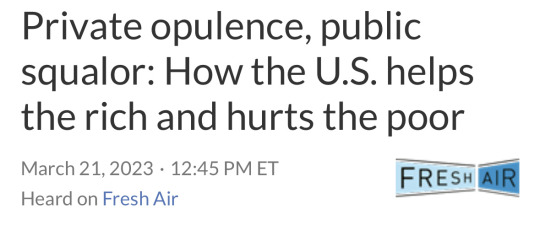
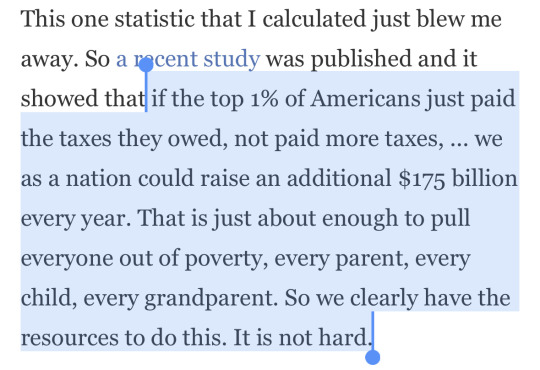
Source
#eat the rich#capitalism#tax the rich#taxes#politics#us politics#income inequality#wealth tax#wealth inequality#socioeconomic inequality#poverty
22K notes
·
View notes
Text
🗣The United States Supreme Court is a corrupt, depraved, illegitimate institution



This coming term, the Supreme Court will hear United States v. Moore, a case that could determine the constitutionality of a hypothetical wealth tax. Given his years of palling around with billionaire benefactors, one thing seems quite clear: Justice Clarence Thomas needs to recuse himself from the case. Commentators who downplay Thomas’ acceptance of massive gifts ask: Maybe it looks bad, but why does it matter? Moore tells us loud and clear.
Moore involves a provision of the 2018 Trump tax bill enacting a “mandatory repatriation tax” for any U.S. taxpayer who owns shares in a foreign corporation, even if the taxpayer never cashed out the money, but automatically reinvested it. Behind this seemingly abstruse issue is a crucial constitutional question: Does the 16th Amendment, which enables the federal government to tax “income,” allow the government to put levies on taxpayers’ assets if they didn’t actually get the money in cash?
In other words, can the federal government place a tax on wealth? This has real implications for both the budget and inequality. Indeed, most ultra-high-wealth individuals possess their assets: They make investments, and hold them. When they die, their heirs’ tax is figured not on the amount of profit earned off of the original cost, but the amount of profit earned off of its value at the time of the original purchaser’s death.
Thus, hundreds of billions of dollars go untaxed—which is just the way multibillionaires like it.
(continue reading) → (more)
#politics#scotus#clarence thomas#harlan crow#wealth tax#taxes#inequality#tax avoidance#united states v. moore#tax dodgers#inheritance tax#legalized bribery#bribery
62 notes
·
View notes
Text


11 notes
·
View notes
Text

#billionaire#wealth inequality#income inequality#income tax#wealth tax#student loan#student loan debt#pandemic#oligarchy
18 notes
·
View notes
Text
🤢
This is obscene.
43 notes
·
View notes


